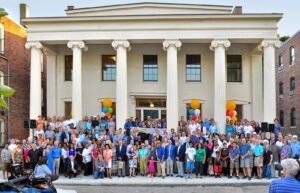
15 Nov Weigh in on new federal historic preservation tax credit proposals before Congress
HBI’s projects like the Fowler Clark Epstein Farm in Mattapan, the Alvah Kittredge House in Roxbury, and the Eustis Street Fire House in Nubian Square could only be done with the availability of the Federal Historic Tax Credit (HTC) program, a valuable source of capital for carrying out quality historic rehabilitation projects throughout the United States. In the next year, preservationists around the country plan to mobilize enough support in the 118th US Congress for expansion of the HTC program, hoping to encourage even more historic rehabilitation projects.
What are Historic Tax Credits?
To promote the rehabilitation of historic buildings and structures, the federal government offers a 20% tax credit to developers toward qualified rehabilitation costs of historic buildings that are either listed on the National Register of Historic Places or eligible for listing. Those credits can be used to offset a federal tax liability, or can be syndicated by a property developer to an investor who will receive the same tax credit in exchange for a cash investment into the rehabilitation project for a five-year period. In states like Massachusetts, state government offers an additional 20% State credit against State tax liability which can be combined with the federal program for additional project capital.
Historic tax credits offer significant benefits to the community:
Historic tax credits effectively decrease the costs for rehabilitation for developers, making it more affordable to undertake preservation projects. They, in turn,
- Preserve more historic structures: HTCs encourage the preservation of historic architecture and cultural heritage, especially vacant and under utilized buildings;
- Revitalize Communities: HTC’s stimulate new economic investment by revitalizing older communities;
- Encourage Affordable Housing: HTCs can work with other housing incentives to rehabilitate historic buildings for new affordable housing units;
- Encourage Environmental Benefits: Renovating existing structures can be more sustainable than building new ones.
Improvements to HTC law before Congress
In March 2023, a bi-partisan coalition of US Senators and Representatives introduced the Historic Tax Credit Growth and Opportunity Act (HTC-GO) in both the US House of Representatives and the Senate, identified as H.R.1785/S.639. These legislative initiatives aim to strengthen the Historic Tax Credit program by streamlining the utilization of the credit for developers, and broadening the range of historic properties that are eligible for the program. Specifically, the permanent provisions
- Increase the historic tax credit from 20% to 30% for small projects that have less than $2.5 million in qualified rehabilitation expenses, thereby encouraging more re-use and preservation of “Main Street”-sized historic buildings.
- Lower the threshold of “substantial rehabilitation costs” — or how much a project must cost to qualify for the federal historic tax credits — so that a greater number of buildings can take advantage of the HTC.
- Streamline the use of HTCs by non-profit organizations whose historic properties support community health centers, local arts centers, affordable housing, homeless services, and other community-focused initiatives. This is accomplished by eliminating IRS restrictions that impede non-profit partnerships with developers and removing lease requirements that presently disqualify non profits from using the historic tax credit.
In Boston, these small modifications would make the rehabilitation of many more smaller historic buildings possible in neighborhood commercial districts, and encourage the re-use of historic buildings for the needs of Bostonians today, particularly affordable housing and social services.
Take Action!
Everyone’s voice counts in the advocacy to pass this legislation, and you can help. Reach out to your US Senator and Representative to support the Historic Tax Credit Growth and Opportunity Act (H.R. 1785/S. 639) by submitting a letter of support through the National Trust for Historic Preservation, whose automated system takes about 5 minutes, and submits your electronic statement of support directly to your elected representatives’ offices.
You can also write to your Senator and Representative directly by consulting the directory of US Representatives or the list of US Senate members. Once you’ve identified your member of Congress, visit their website and locate the “write your member” section. Choose “tax” as the issue category and kindly urge your federal lawmakers to consider co-sponsoring HTC-GO. A template has been prepared for your convenience: HTC_letter of support template.
With your support and that of many across the country, more of our historic places will be preserved and used for new purposes.





